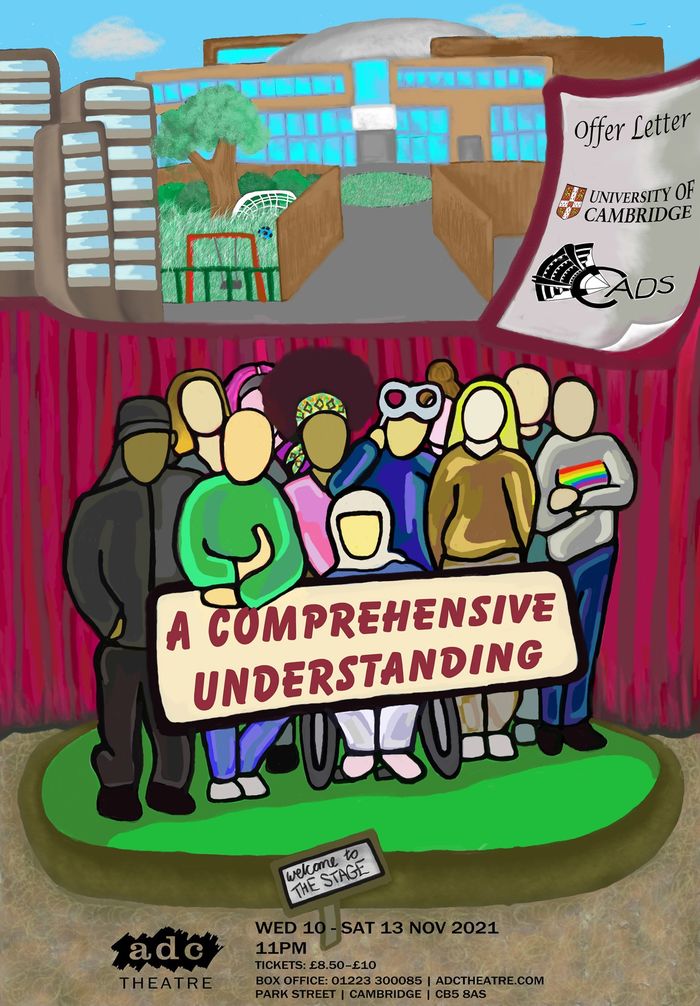The Man Who Wouldn’t Be Murdered: ‘Sleazy, gleeful and something special’
Gregory Miller reviews this weeks Corpus Lateshow, The Man Who Wouldn’t Be Murdered

The Man who Wouldn’t be Murdered is a sleazy slice of fun, gleefully replete with amorality and dark humour. The show, written by Lily Blundell, takes as its subject the fabled Michael Malloy, a modern-day Rasputin of sorts who, despite the murderous plots of speakeasy owner Tony Morino and his two accomplices, simply will not die. As you might expect, it could be all too easy for this show to simply use Malloy’s story as an excuse for absurd gags, and yet the show is a lot more than that, much to its credit.
The show’s structure moved often seamlessly between song, underscored exposition and dialogue scenes between characters, with sections of speak-singing chugging along before flowering into full song. The dialogue scenes had a lovely, off-kilter humour to them, with some moments of writing and delivery which were rather reminiscent of the humour one might find in a Lynch film. Sometimes the acting was a little too ‘out’ into the audience, since some moments in the script would have benefitted from the actors really speaking to each other a little more. But outside of these moments the actors, directed by Nathaniel Gunn, were confident and assured. In particular, the actors weren’t afraid to let silence linger onstage a little, something that really brought out some of the absurd humour in the script.
“Big, choral numbers also grew and transmuted in unexpected ways, moving from upbeat raucousness to doom and gloom”
Outside of the dialogue scenes, the show’s musical numbers were incredible. One song in particular about life insurance might just be the best song about life insurance which this humble spectator has ever been witness to. I am a tad biased here, since they were bluesy, jazzy, and right down my tin pan alley. The big, choral numbers also grew and transmuted in unexpected ways, moving from upbeat raucousness to doom and gloom. Another thing about these songs, and the show in general, is that the subtle shifts in tone were handled very well. The key shifted from gleeful comedy to brooding morality play and back, without it ever feeling cheap or contrived. The duets and solos were also beautifully written and performed. The choreography for these numbers was also lively and often very well-handled indeed. But there’s little point in me mentioning this further, other than saying the music really is something special. If I were to say any more, I’d simply start recycling the same platitudes. So we’ll move on.
The performances were also excellent around the board. Some freshers we have here, eh! Jamie Ellis, playing the main rogue Tony, did a great job of juggling both charisma and imperiousness in equal measure. His two accomplices, also, played by Kate South and Megan Conion, were both frequently hilarious. The scenes with this trio provided some of the best off-kilter comedy in the show, with Conion’s entrance as the barman being something to behold in particular. Isabel May was assured in the role of Josephine, Tony’s longsuffering wife, providing real pathos and sincerity in a show which otherwise thrived on irony and bathos. The quiet sadness in her dialogue with Tony, as well as her solo song, was something which imbued the play nicely, making it more than just a funny joke. Crucial, in fact, to the serious underbelly of this play was the role of Death, played by Marie- Ange- Camara. As a recurring narrator and commentator, she dictated the shifts in tone of the show from gallows humour to mere bleakness with real aplomb. Hugo Gregg, as Michael Malloy, was also suitably raucous and depraved when called upon, and delivered some of his non-sequitur lines with great timing. The chorus also, it must be said, were given a hell of a lot to do. Sometimes the chorus can be relegated to little more than necessary amplification, but each person was here given at least some moments to shine. Be it Maria Eduarda Ticianelli Lopez as Harry Green, Charlotte Evershed as the chief insurer – in a song which, as mentioned, was cracking – or Alex Huntley as the judge, everyone had some special moments. Really, when it comes down to it, that is all that can be asked of a show.
In brief, this show is something special. It tackles a theme which could easily be made into cheap absurd comedy, and does something a little deeper with it. The humour is still there, but it is dark and full of warning. It is filled with dirt, sleaze and amorality, and still manages to make you leave the theatre feeling clean. So, while this show is still on, go and drink it up. Go on now, it won’t kill you.
 News / Caius mourns its tree-mendous loss23 December 2025
News / Caius mourns its tree-mendous loss23 December 2025 News / Clare Hall spent over £500k opposing busway 24 December 2025
News / Clare Hall spent over £500k opposing busway 24 December 2025 Comment / Yes, I’m brown – but I have more important things to say22 December 2025
Comment / Yes, I’m brown – but I have more important things to say22 December 2025 Interviews / Politics, your own way: Tilly Middlehurst on speaking out21 December 2025
Interviews / Politics, your own way: Tilly Middlehurst on speaking out21 December 2025 News / King appoints Peterhouse chaplain to Westminster Abbey22 December 2025
News / King appoints Peterhouse chaplain to Westminster Abbey22 December 2025









